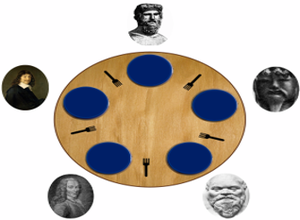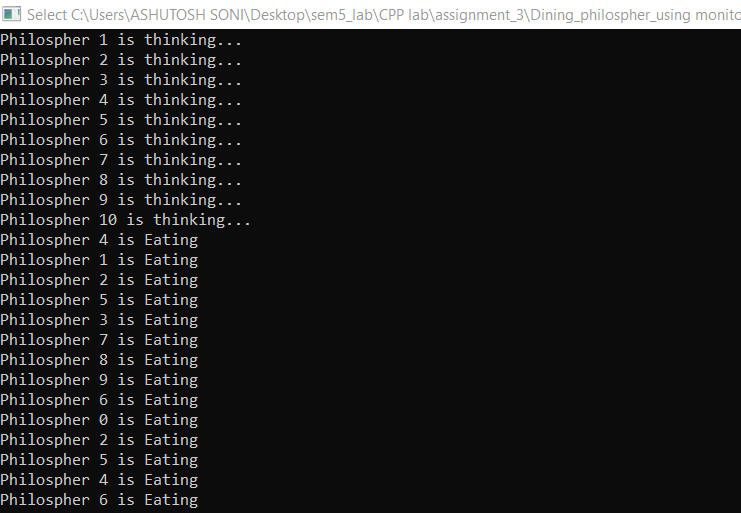Dining Philosophers Problem
Last Updated :
23 Jul, 2025
The Dining Philosopher Problem is a classic synchronization and concurrency problem that deals with resource sharing, deadlock, and starvation in systems where multiple processes require limited resources. In this article, we will discuss the Dining Philosopher Problem in detail along with proper implementation.
Problem Statement
The Dining Philosopher Problem involves 'n' philosophers sitting around a circular table. Each philosopher alternates between two states: thinking and eating. To eat, a philosopher needs two chopsticks, one on their left and one on their right. However, the number of chopsticks is equal to the number of philosophers, and each chopstick is shared between two neighboring philosophers.
The standard problem considers the value of 'n' as 5 i.e. we deal with 5 Philosophers sitting around a circular table.
Constraints and Conditions for the Problem
- Every Philosopher needs two forks to eat.
- Every Philosopher may pick up the forks on the left or right but only one fork at once.
- Philosophers only eat when they have two forks. We have to design such a protocol i.e. pre and post protocol which ensures that a philosopher only eats if he or she has two forks.
- Each fork is either clean or dirty.

Solution
The correctness properties it needs to satisfy are:
- Mutual Exclusion Principle: No two Philosophers can have the two forks simultaneously.
- Free from Deadlock: Each philosopher can get the chance to eat in a certain finite time.
- Free from Starvation: When few Philosophers are waiting then one gets a chance to eat in a while.
- No strict Alternation
- Proper utilization of time
Algorithm
loop forever
p1: think
p2: preprotocol
p3: eat
p4: postprotocol
First Attempt
We assume that each philosopher is initialized with its index I and that addition is implicitly modulo 5. Each fork is modeled as a semaphore where wait corresponds to taking a fork and signal corresponds to putting down a fork.
Algorithm
semaphore array[0..4] fork ← [1, 1, 1, 1, 1]
loop forever
p1 : think
p2 : wait(fork[i])
p3 : wait(fork[i + 1])
p4 : eat
p5 : signal(fork[i])
p6 : signal(fork[i + 1])
Problem with this solution:
This solution may lead to a deadlock under an interleaving that has all the philosophers pick up their left forks before any of them tries to pick up a right fork. In this case, all the Philosophers are waiting for the right fork but no one will execute a single instruction.
Second Attempt
One way to tackle the above situation is to limit the number of philosophers entering the room to four. By doing this one of the philosophers will eventually get both the fork and execute all the instruction leading to no deadlock.
Algorithm
semaphore array[0..4] fork ← [1, 1, 1, 1, 1]
semaphore room ← 4
loop forever
p1 : think
p2 : wait(room)
p3 : wait(fork[i])
p4 : wait(fork[i + 1])
p5 : eat
p6 : signal(fork[i])
p7 : signal(fork[i + 1])
p8 : signal(room)
In this solution, we somehow interfere with the given problem as we allow only four philosophers.
Third Attempt
We use the asymmetric algorithm in the attempt where the first four philosophers execute the original solution but the fifth philosopher waits for the right fork and then for the left fork.
Algorithm
semaphore array [0..4] fork ← [1,1,1,1,1]
For the first Four Philosophers
loop forever
p1 : think
p2 : wait(fork[i])
p3 : wait(fork[i + 1])
p4 : eat
p5 : signal(fork[i])
p6: signal(fork[i + 1])
For the Fifth Philosopher
loop forever
p1 : think
p2 : wait(fork[0])
p3 : wait(fork[4])
p4 : eat
p5 : signal(fork[0])
p6 : signal(fork[4])
Note: This solution is also known as Chandy/Misra Solution.
Advantages of this Solution
- Allows a large degree of concurrency
- Free from Starvation
- Free from Deadlock
- More Flexible Solution
- Economical
- Fairness
- Boundedness
The above discussed the solution for the problem using semaphore. Now with monitors, Here, Monitor maintains an array of the fork which counts the number of free forks available to each philosopher. The take Forks operation waits on a condition variable until two forks are available. It decrements the number of forks available to its neighbor before leaving the monitor. After eating, a philosopher calls release Forks which updates the array fork and checks if freeing these forks makes it possible to signal.
Algorithm
monitor ForkMonitor:
integer array[0..4]
fork ← [2,2,2,2,2]
condition array[0..4]OKtoEat
operation takeForks(integer i)
if(fork[i]!=2)
waitC(OKtoEat[i])
fork[i+1]<- fork[i+1]-1
fork[i-1] <- fork[i-1]-1
operation releaseForks(integer i)
fork[i+1] <- fork[i+1]+1
fork[i-1] <- fork[i-1]
if(fork[i+1]==2)
signalC(OKtoEat[i+1])
if(fork[i-1]==2)
signalC(OKtoEat[i-1])
For Each Philosopher
loop forever :
p1 : think
p2 : takeForks(i)
p3 : eat
p4 : releaseForks(i)
Here Monitor will ensure all such needs mentioned above.
Implementation of Dining Philosophers Problem
Here is the Program for the same using monitors in C++ as follows.
C++14
// Header file include
#include <bits/stdc++.h>
#include <pthread.h>
#include <unistd.h>
using namespace std;
#define N 10
#define THINKING 2
#define HUNGRY 1
#define EATING 0
#define LEFT (phnum + 4) % N
#define RIGHT (phnum + 1) % N
// Philosopher index
int phil[N];
int times = 200;
class monitor
{
// state of the philosopher
int state[N];
// Philosopher condition variable
pthread_cond_t phcond[N];
// mutex variable for synchronization
pthread_mutex_t condLock;
public:
// Test for the desired condition
// i.e. Left and Right philosopher are not reading
void test(int phnum)
{
if (state[(phnum + 1) % 5] != EATING and state[(phnum + 4) % 5] != EATING and state[phnum] == HUNGRY)
{
state[phnum] = EATING;
pthread_cond_signal(&phcond[phnum]);
}
}
// Take Fork function
void take_fork(int phnum)
{
pthread_mutex_lock(&condLock);
// Indicates it is hungry
state[phnum] = HUNGRY;
// test for condition
test(phnum);
// If unable to eat.. wait for the signal
if (state[phnum] != EATING)
{
pthread_cond_wait(&phcond[phnum], &condLock);
}
cout << "Philosopher " << phnum << " is Eating" << endl;
pthread_mutex_unlock(&condLock);
}
// Put Fork function
void put_fork(int phnum)
{
pthread_mutex_lock(&condLock);
// Indicates that I am thinking
state[phnum] = THINKING;
test(RIGHT);
test(LEFT);
pthread_mutex_unlock(&condLock);
}
// constructor
monitor()
{
for (int i = 0; i < N; i++)
{
state[i] = THINKING;
}
for (int i = 0; i < N; i++)
{
pthread_cond_init(&phcond[i], NULL);
}
pthread_mutex_init(&condLock, NULL);
}
// destructor
~monitor()
{
for (int i = 0; i < N; i++)
{
pthread_cond_destroy(&phcond[i]);
}
pthread_mutex_destroy(&condLock);
}
}
// Global Object of the monitor
phil_object;
void *philosopher(void *arg)
{
int c = 0;
while (c < times)
{
int i = *(int *)arg;
sleep(1);
phil_object.take_fork(i);
sleep(0.5);
phil_object.put_fork(i);
c++;
}
}
int main()
{
// Declaration...
pthread_t thread_id[N];
pthread_attr_t attr;
// Initialization...
pthread_attr_init(&attr);
pthread_attr_setdetachstate(&attr, PTHREAD_CREATE_JOINABLE);
for (int i = 0; i < N; i++)
{
phil[i] = i;
}
// Creating...
for (int i = 0; i < N; i++)
{
pthread_create(&thread_id[i], &attr, philosopher, &phil[i]);
cout << "Philosopher " << i + 1 << " is thinking..." << endl;
}
// Joining....
for (int i = 0; i < N; i++)
{
pthread_join(thread_id[i], NULL);
}
// Destroying
pthread_attr_destroy(&attr);
pthread_exit(NULL);
return 0;
}
# Importing required libraries
import threading
import time
# Constants
N = 10
THINKING = 2
HUNGRY = 1
EATING = 0
times = 200
# Philosopher index
phil = [i for i in range(N)]
class Monitor:
def __init__(self):
# state of the philosopher
self.state = [THINKING] * N
# Philosopher condition variable
self.phcond = [threading.Condition() for _ in range(N)]
# Test for the desired condition
# i.e. Left and Right philosopher are not eating
def test(self, phnum):
with self.phcond[phnum]:
if (self.state[(phnum + 1) % N] != EATING and
self.state[(phnum + N - 1) % N] != EATING and
self.state[phnum] == HUNGRY):
self.state[phnum] = EATING
self.phcond[phnum].notify()
# Take Fork function
def take_fork(self, phnum):
with self.phcond[phnum]:
# Indicates it is hungry
self.state[phnum] = HUNGRY
# test for condition
self.test(phnum)
# If unable to eat.. wait for the signal
if self.state[phnum] != EATING:
self.phcond[phnum].wait()
print(f"Philosopher {phnum} is Eating")
# Put Fork function
def put_fork(self, phnum):
with self.phcond[phnum]:
# Indicates that I am thinking
self.state[phnum] = THINKING
self.test((phnum + 1) % N)
self.test((phnum + N - 1) % N)
# Global Object of the monitor
phil_object = Monitor()
def philosopher(phnum):
c = 0
while c < times:
time.sleep(1)
phil_object.take_fork(phnum)
time.sleep(0.5)
phil_object.put_fork(phnum)
c += 1
def main():
# Creating...
threads = []
for i in range(N):
t = threading.Thread(target=philosopher, args=(phil[i],))
threads.append(t)
t.start()
print(f"Philosopher {i + 1} is thinking...")
# Joining....
for i in range(N):
threads[i].join()
if __name__ == "__main__":
main()
Output
 Output for Dining Philosophers problem for the above program
Output for Dining Philosophers problem for the above programConclusion
The Dining Philosopher Problem teaches us how to handle shared resources in a system while avoiding issues like deadlock and starvation. It highlights challenges like deadlock and starvation and teaches how to prevent them using proper synchronization techniques. The problem is a classic example used to study synchronization and resource allocation in concurrent systems.
Dining philosophers Problem in Operating System
Visit Course

Explore
OS Basics
Process Management
Memory Management
I/O Management
Important Links